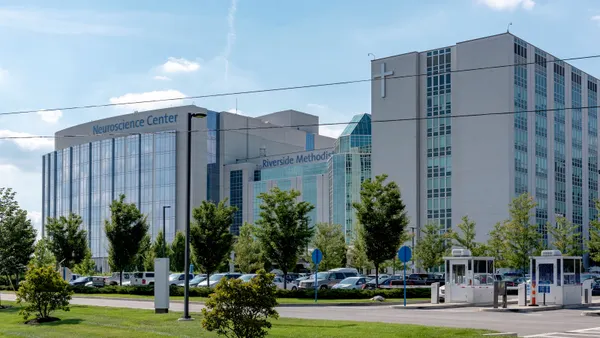Dive Brief:
- Indiana’s health department has approved Union Hospital’s acquisition of Terre Haute Regional Hospital, despite opposition to the deal from antitrust regulators in both the Biden and Trump administrations.
- Gov. Mike Braun announced the green light on Sunday after state regulators approved Union’s application for a Certificate of Public Advantage, clearing the way for the merger to be finalized. It’s the state’s first approval under its law allowing COPAs, which are controversial mechanisms that make it easier for potentially anticompetitive hospital mergers to pass regulatory review.
- Braun said the merger, which Union has pursued for years, would lower prices and make healthcare more accessible for Indiana residents. However, the Federal Trade Commission and independent antitrust experts have found that the merger will raise costs, worsen access for patients and lower wage growth for hospital workers.
Dive Insight:
Union Hospital’s parent company Union Health has been trying to acquire Terre Haute Regional from HCA Healthcare since at least 2021, when the system started lobbying Indiana to pass its COPA law. Union submitted a formal application for the certificate in September 2023, before pulling the application following opposition from federal antitrust regulators.
Union refiled its COPA request to combine 341-bed Union Hospital and 278-bed Terre Haute Regional on Indiana’s western edge in early 2025. But the second application had many of the same issues as the first, according to critics who argued the COPA wouldn’t save money and could impact the quality of care for Indiana residents.
The deal was opposed by patient advocates, health policy experts, the state’s own attorney general and the FTC.
Still, the Indiana Department of Health has now approved the union, arguing that the merger’s benefits outweigh its disadvantages.
“The result of this merger will be lower prices and more healthcare services available to residents of Terre Haute and Vigo County because of the strict operating terms and conditions that Union accepted,” Braun said in a statement. “This will bring long-term improvement to the community’s health outcomes.”
Indiana is one of 19 states that allow COPAs, which shield hospital mergers from federal antitrust laws by replacing competition with stricter state oversight. States can approve hospital deals that might significantly reduce competition or create a monopoly if said hospitals can prove their merger will benefit the public.
In March, the FTC found that loss of competition as a result of a Union-Terre Haute merger would lead to higher healthcare prices and service reductions for Indiana patients. The impact would be especially pronounced in Indiana’s Vigo County, where a combined Union-Terre Haute Regional system would hold almost three-fourths of the market for inpatient hospital services, according to the FTC.
The agency urged Indiana to reject Union’s COPA application as a result.
Indiana understands that the COPA creates a monopoly for inpatient hospital services in Vigo County, according to the state’s approval brief. However, state regulators said they were comfortable with guardrails that Union and Terre Haute agreed to as part of the COPA, including commitments to price caps and service preservation.
“The commitments supplemented through these discussions between the Department and Union provide further assurances that any decreases in population health outcomes or negative economic impacts resulting from the Proposed Merger will be appropriately remediated,” the state wrote in the brief.
However, it’s very tricky to enforce those commitments, the FTC said in March. Punishments that the state has at its disposal become fairly weak after the deal closes, according to Zack Cooper, an associate professor of public health and economics at Yale University. For example, a hospital monopoly can easily pass a state fine along to patients.
“[State regulators] have plans in there. What’s hard is enforcing regulations once you don’t have competition anymore and the hospitals gain market power,” Cooper said.
In addition, Union is under no long-term commitment to good behavior. After the COPA expires — its stipulations start ending in five years — the region will be left with a hospital monopoly with very little oversight.
“Undoubtedly, as soon as the COPA expires, we’re going to see double-digit price increases,” said Cooper, who has studied Union’s COPA application.
In a statement Monday, Union thanked Indiana for approving the merger, and said that combining Union Hospital and Terre Haute Regional would preserve medical care in the region.
“We know this is this right decision and is in the best interest of our community, ensuring care close to home for generations to come,” Union Health CEO Steve Holman said.
Federal antitrust regulators have long been wary of COPAs, which have been rising despite evidence that the certificates lead to increases in inpatient prices, along with declines in care quality.
In one example, 20-hospital system Ballad Health in Tennessee and Virginia saw its wait times for patients in the emergency room more than triple since it was formed by a COPA in 2018, according to KFF Health News. The Tennessee official responsible for monitoring the COPA said the state’s grading system allowed Ballad to continue operating under the COPA even though it continually failed to meet quality standards, according to the FTC.
Similarly, Mission Health in North Carolina’s commercial inpatient prices jumped 20% while it had a COPA, and 38% after its COPA was repealed, the agency said in its March comments on Union’s COPA request.















